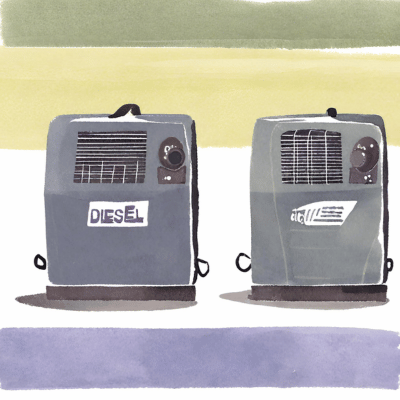In our modern world, where electricity plays a fundamental role in almost all aspects of daily life, the importance of power generators is undeniable. Whether for backup power during outages, supporting outdoor recreational activities, or as indispensable tools on construction sites, generators provide energy where and when it is most needed. But which backup generators offer the highest performance, the lowest noise levels, and the most environmentally friendly fuel consumption? Are they diesel or gasoline backup generators? Small and portable or rather large, site-specific power generators?
This blog post provides a detailed overview of the different types of generators and their applications to help you make the best choice for your specific needs.
A Variety of Options: An Overview of Power Generators
In general, power generators are distinguished between the following types:
- Gasoline generators
- Diesel generators
- Gas generators
- Bi-fuel generators
- Inverter generators
When it comes to using backup generators, there are primarily two types: standby generators and portable backup generators. Standby generators are fixed installations that provide continuous power supply for residential or commercial buildings. On the other hand, portable backup generators are mobile power sources that are particularly suitable for temporary power needs such as camping trips or outdoor events.
Types of Fuels for Power Generators - Gas, Diesel, or Gasoline?
The choice of fuel for your backup generator should not be taken lightly. Availability, cost, environmental impact, and performance are important factors. For infrequent use or mobile applications, gasoline or gas generators might be ideal, while diesel generators may be better suited for frequent or intensive use. Regardless of the generator chosen, proper maintenance is crucial for the safety and longevity of the equipment. Regular inspections, proper fuel storage, and adherence to safety precautions are essential.
Diesel, Gasoline, and Gas Generators: An Overview
Each type of fuel has its own advantages and disadvantages, which vary depending on the application and availability.
- Diesel generators are known for their efficiency and durability, however, they may be less suitable for residential areas due to noise and emissions.
- Gasoline generators are widely used and offer a good balance between availability and cost, but they require more frequent maintenance.
- Gas generators (natural gas, propane) are considered more environmentally friendly options, offering cleaner combustion and often more cost-effective operation.
- Bi-fuel generators can be operated with a combination of diesel and another fuel, providing flexibility in fuel supply and potential cost savings.

Diesel generators
Advantages
- High efficiency
- Long operating life
- Robustness
Disadvantages
- Higher emission levels
- Noise level
Usage
- Long-term use
- Heavy loads
Efficiency
- Very efficient with continuous operation
Gasoline engines
Advantages
- Widely used and readily accessible
- cost-effective
Disadvantages
- Higher maintenance effort
- Volatile fuel
Usage
- General use
- Smaller devices
Efficiency
- Efficient for short run times and lighter loads
Gas generators (natural gas, propane)
Advantages
- Environmentally friendly
- Often cheaper to operate
Disadvantages
- Requires gas connection or
- Storage of gas cylinders
Usage
- Households and businesses with access to natural gas
- Environmentally conscious users
Efficiency
- Often high efficiency depending on gas type
Portable or standby?
Energy on the move: focus on portable generators
Portable generators are compact, mobile power sources that can be easily transported from one place to another. They are ideal for temporary power needs such as camping trips, outdoor events or as a backup power source at home. Thanks to their handy size and portability, they can be easily taken on trips or transported to the other end of the property to power devices. Despite their practical advantages, it is important to note that portable generators have both their advantages and disadvantages.
☛ Who are they suitable for?
Advantages and disadvantages of portable generators
Advantages
- Flexibility and mobility
- No complex installation required
- More cost-effective than standby generators
Disadvantages
- Limited power capacity
- Regular monitoring and manual operation required
- Rarely quiet
Standby generators: Reliable power source around the clock
☛ Who are they suitable for?
Advantages and disadvantages of standby generators
Advantages
- Automatic switch-on in the event of a power failure
- Higher performance capacity
- Lower operating expenses
Disadvantages
- Higher acquisition and installation costs
- Requires regular maintenance by qualified personnel
- Takes up more space
Comparison between portable and standby generators
Portable generators
Standby generators
- Costs: Cheaper to purchase
- Installation: No fixed installation necessary, ready for immediate use
- Maintenance: Easier maintenance, often carried out by the user
- Area of application: Flexible use for temporary requirements
- Automation: Manual start required
- Performance: Limited power capacity, suitable for smaller loads
- Noise development: Can be noisy, depending on model and location
- Mobility: High, can be easily transported
- Costs: Higher acquisition and installation costs
- Installation: Requires professional installation
- Maintenance: Easier maintenance, often carried out by the user
- Area of application: Permanently installed for continuous operation
- Automation: Automatic start possible in the event of a power failure
- Performance: Higher power capacity, can supply entire houses or buildings
- Noise development: Often quieter, especially models with sound insulation
- Mobility: None, permanently installed
Which emergency generator do you choose: gas, diesel or gasoline?
Power generators are a versatile and often vital addition for many scenarios - from emergency power supply to powering outdoor activities. The right choice of generator depends on a variety of factors, including your needs, budget and preferred fuel type. Weigh up the pros and cons of each fuel type and generator type to find out whether a mobile or fixed generator, gas, diesel or gasoline is better suited to you and your purposes. With the information in this guide, you will be well equipped to make an informed decision that best suits your needs.





